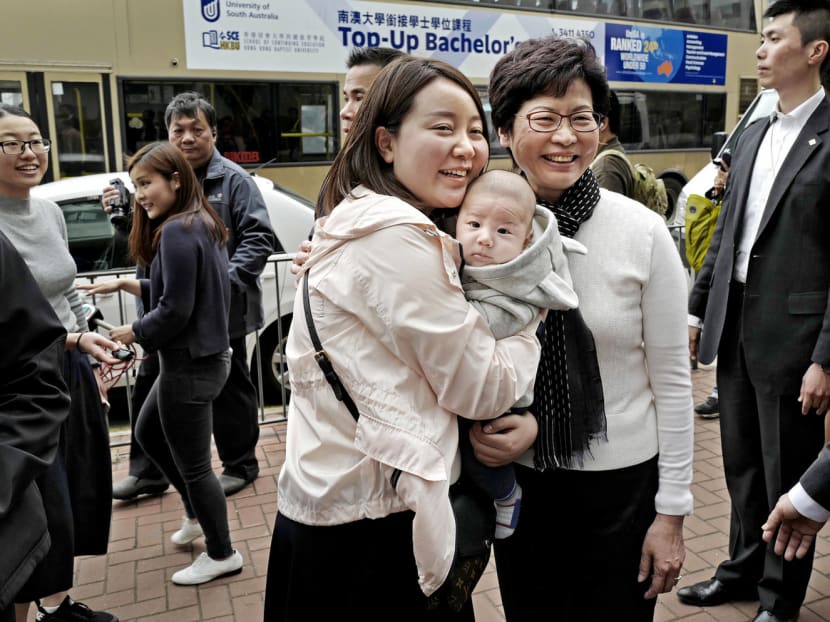New HK leader vows govt will have a ‘high degree of autonomy’
HONG KONG — The city’s next chief executive has pledged her ministers will “be in charge of their own work”, rather than relying on the central government’s involvement in the city to push her administration’s agenda.

Hong Kong’s Chief Executive-elect Carrie Lam (right) with local residents in Hong Kong on Monday. Mrs Lam will be the city’s first ever female leader on July 1. Photo: AP
HONG KONG — The city’s next chief executive has pledged her ministers will “be in charge of their own work”, rather than relying on the central government’s involvement in the city to push her administration’s agenda.
Mrs Carrie Lam, the former chief secretary who won the city’s leadership election on Sunday, said the local government’s “high degree of autonomy” would be a key principle in her style of government.
The comments come amid accusations that current Chief Executive Leung Chun-ying has become overly reliant on the central government’s help to rally support.
Mrs Lam was set to visit three mainland bodies in the city — the central government’s liaison office, the Commissioner’s Office of China’s Foreign Ministry in Hong Kong and the People’s Liberation Army (PLA) — as early as today.
Yesterday, she told Commercial Radio: “Under the high degree of autonomy, SAR government officials should be in charge of their own work.
“I will see that as the guiding principle of the new Cabinet,” she said, referring to the government by its official name, Hong Kong Special Administrative Region (SAR).
During Mr Leung’s tenure, the liaison office — the main bridge of communication between Hong Kong and mainland China — became more involved in local politics. A number of pro-establishment legislators have admitted the office lobbied them to back the local government’s unpopular Bills and funding requests.
Mrs Lam promised the next administration would change that, and improve its lobbying. She said ministers should be the ones most familiar with policies, and know where political compromises lie.
“Hongkongers have hoped the ‘one country, two systems’ model would be defended ... and we should respond immediately if our work has created some perception which hampers their confidence in that,” she said, referencing the principle under which the city enjoys special rights and freedoms not granted to cities in mainland China.
Mrs Lam was Beijing’s preferred choice for city leader, and the liaison office reportedly canvassed for her behind the scenes. But she earlier claimed her upcoming visit to the liaison office was just a courtesy call, rather than an expression of gratitude.
Since the handover in 1997, the PLA has been in Hong Kong and is responsible for the city’s defence, according to the Basic Law. The local garrison cannot interfere in local affairs, but the government can call it in to maintain public order or help with disaster relief.
The functions of the Commissioner’s Office of China’s Foreign Ministry in Hong Kong include helping the local government deal with bilateral agreements between Hong Kong and foreign governments, coordinating the city’s participation in international conferences, and processing applications of foreign state aircraft and warships to enter Hong Kong.
Mrs Lam, who will be the city’s first ever female leader on July 1, yesterday said she was “very determined” to tackle the high cost of housing in the densely populated city, among the top concerns of foreign business people working there.
The cost of housing is one of Hong Kong’s biggest social issues, and making homes more affordable was among Mr Leung’s top priorities, something he failed to achieve.
Mrs Lam said land and labour were two “major bottlenecks” for Hong Kong’s development.
“On the land issue, I am very determined to tackle that in the next term of government in a big way,” she told an audience of 200 financial and business professionals at a Credit Suisse investment conference. “It’s not just looking at the annual land sale programme but, really, the long-term supply of land or, better still, a land bank for Hong Kong.”
Mrs Lam had also pledged during her campaign to tackle the problem by increasing land supply.
She is also set to break away from one tradition when she assumes the city’s top job: Her mathematician husband, Mr Lam Siu-por, will not take up any honorary chairmanship of a number of non-governmental organisations (NGOs), normally accepted by the chief executive’s wife.
“Siu-por is a very low-profile academic ... he does not want to change (his way of life) even when I become chief executive,” said Mrs Lam, adding that she would talk to the NGOs in question about whether their constitutions should be amended, and how to fill the vacancies. AGENCIES





